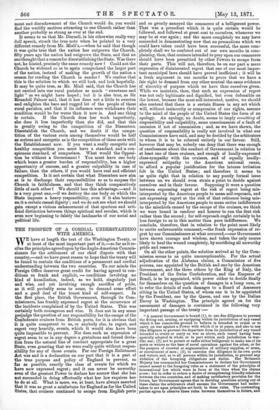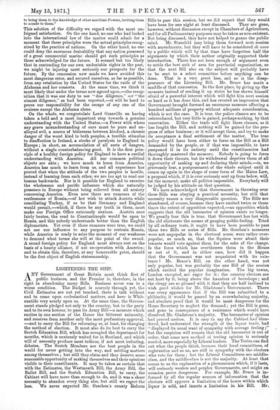THE PROSPECT OF A CORDIAL UNDERSTANDING WITH AMERICA.
Mhave at length the text of the Washington Treaty, or A least of the most important part of it,—so far as it re- cites the principles agreed upon bythe Anglo-American Commis- sioners for the settlement of our chief dispute with that country,—and we have great reason to hope that the treaty will be found to contain the conditions of a permanent and cordial understanding between the two countries. To our minds the Foreign Office deserves great credit for having agreed to con- ditions so frank and explicit, — conditions involving no kind of humiliation, indeed, as we hold, singularly just and wise, and yet involving enough sacrifice of pride, as it will probably seem to some, to demand some effort and a good deal of the truest kind of self-respect. In the first place, the British Government, through its Com- missioners, has frankly expressed regret at the occurrence of the incidents complained of by the United States. This was certainly both courageous and wise. It does not in any sense prejudge the question of our responsibility for the escape of the Confederate cruisers from British ports, for it is obvious that it is quite competent to us, or anybody else, to regret, and regret very heartily, events, which it would also have been quite impossible to prevent. Nor does such an expression of regret seem to us in any degree a gratuitous and forced devia- tion from the natural line of conduct appropriate for a great State, even granting that we were really quite without respon- sibility for any of those events. For our Foreign Enlistment Act was and is a declaration on our part that it is a part of the true purpose and policy of England to prevent, so far as possible, exactly the class of events for which we have now expressed regret ; and it can never be unworthy even of the greatest Power to declare her sorrow that she has not succeeded in doing effectually what her law requires her to do at all. What is more, we, at least, have always asserted that it was as great a misfortune for England as for the United States, that cruisers continued to escape from English ports and so greatly annoyed the commerce of a belligerent power. That was a precedent which it is quite certain would be followed, and followed at great cost to ourselves, whenever we may be at war again ; and the more completely we may have succeeded in demonstrating now that no precautions which we could have taken could have been successful, the more com- pletely shall we be confuted out of our own mouths in com- plaining, then, that cruisers intended to prey upon our commerce should have been permitted by other Powers to escape from their ports. This will not, therefore, be on our part a mere expression of disinterested regret that one of our most impor- tant municipal laws should have proved inefficient ; it will be a fresh argument in our mouths to prove that we have a fair right to demand from any other neutral the same evidence of sincerity of purpose which we have thus ourselves given. While we maintain, then, that such an expression of regret was not only legitimate and dignified, but even defensible on the lowest, because the most self-interested, motive, we should also contend that there is a certain fitness in any act which will, without insincerity or compromise of our rights, assume to the mind of the people of the United States the form of an apology. An apology, no doubt, seems to imply something of responsibility and culpability, some consciousness of a fault of omission if not of commission ; and, as we have shown, the question of responsibility is really not involved in what our Commissioners have said, and may be decided by the arbitrators to whom it is to be referred entirely in our favour. Still, however that may be, nobody can deny that there was enough of carelessness about the conduct of Government in relation to at least one of these cruisers, and enough of loudly-expressed class-sympathy with the cruisers, and of equally loudly- expressed antipathy to the American national cause, to afford a popular justification for the intense irritation felt in the United States ; and therefore it seems to us quite right that in relation to any purely formal issue between us, we should even strain a point to decide against ourselves and in their favour. Supposing it were a question between expressing regret at the risk of regret being mis- interpreted by the American people to mean self-reproach, and not expressing regret at the risk of that reticence being mis- interpreted by the American people to mean entire indifference to the mischiefs caused by the escape of the cruisers, we think we were bound in candour and honour to run the first risk rather than the second ; for self-reproach ought certainly to be less foreign to us in this matter than pure indifference. We conclude, therefore, that in relation to the point most likely to excite unfavourable comment,—the frank expression of re- gret by our Commissioners at what occurred,—our Government have shown courage and wisdom, and taken the only course likely to heal the wound completely, by sacrificing all unworthy
pride and reserve.
On all the other points, the solution arrived at by the Com- mission seems to us quite unexceptionable. For the actual adjudication of the Alabama claims, a Commission of five persons, one appointed by the British and one by the American Government, and the three others by the King of Italy, the President of the Swiss Confederation, and the Emperor of Brazil, is to be appointed, with power either to decide finally for themselves on the question of damages in a lump sum, or to refer the details of such damages to a Board of Assessors sitting in the United States, of whom one is to be appointed by the President, one by the Queen, and one by the Italian Envoy in Washington. The principle agreed on for the assessment of damages is contained in the following very important passage of the treaty :—
" A neutral Government is bound (1), to use due diligence to prevent the fitting out, arming, or equipping within its jurisdiction of any vessel which it has reasonable ground to believe is intended to cruise or to carry on war against a Power with which it is at peace, and also to use like diligence to prevent the departure from its jurisdiction of any vessel intended to cruise or carry on war as above, such vessel having been specially adapted in whole or in part within such jurisdiction to war- like use ; (2), not to permit or suffer either belligerent to make use of its ports or waters as the base of naval operations against the other, or for the purpose of renewal or augmentation of military supplies, or arms, or recruitment of men ; (3), to exercise due diligence in its own ports and waters, and, as to all persona within its jurisdiction, to prevent any violation of the foregoing obligations and duties. Her Britannic Majesty has commanded her Commissioners to declare her Government cannot assent to the foregoing rules as a statement of the principles of international law which were in force at the time when the claims arose ; but in order to evince a desire of strengthening friendly relations between the two countries, and of making satisfactory provision for the future, her Government agrees that in deciding questions arising out of these claims the arbitrators shall assume the Government bad under- taken to act upon principles set forth in these rules. The contracting parties agree to observe these rules between themselves in future, and
to bring them to the knowledge of other maritime Powers, inviting them to accede to them."
This solution of the difficulty we regard with the most un- feigned satisfaction. On the one hand, no one who had looked into the international law of the matter could admit for a moment that these principles were the actual principles recog- nized by the practice of nations. On the other hand, no one could deny the enormous desirability that any nation possessed of a great commercial marine should get such principles as these acknowledged for the future. It seemed but too likely that in contending for our own undeniable rights in the past, we might be injuring most seriously our prospects for the future. By the concession now made we have avoided this most dangerous error, and secured ourselves, as far as possible, from any retaliation by the United States for the raids of the Alabama and her consorts. At the same time, we think it most likely that under the terms now agreed upon,—the recog- nition that it was our duty to use "due diligence," not "the utmost diligence," as had been reported,—it will be hard to prove our responsibility for the escape of any one of the cruisers except the Alabama alone.
On the whole, we congratulate Lord Granville on having taken a bold and a most important step towards a genuine understanding with the United States,—a Power with whom any grave misunderstanding of ours must be pure and un- alloyed evil, a source of bitterness between kindred, a chronic danger of the worst kind to both peoples, a terrible stimulus to disaffection in Ireland, a stroke of paralysis to England in Europe ; in short, an accumulation of all sorts of dangers, without a single counterbalancing good. It is the first prin- ciple of a healthy foreign policy for England to have a cordial understanding with America. All our common political objects are akin ; we have much to learn from America, America has much to learn from us, and all experience has proved that when the attitude of the two peoples is hostile, instead of learning from each other, we are too apt to read our lessons backwards. Nor is it possible for England to exercise the wholesome and pacific influence which she naturally possesses in Europe without being relieved from all anxiety concerning America. Even now there are rumours of the restlessness of Russia,—of her wish to attack Austria while conciliating Turkey, if so be that Germany and England would permit,—which, if there be any truth in them, must make our Foreign Office extremely anxious. Austria once fairly beaten, the road to Constantinople would 'be open to Russia, and this nobody understands better than the English diplomatists. Yet even if these rumours were true, we could not use our influence to any purpose to restrain Russia, while America is ready to seize the moment of our weakness to demand what terms she will at the point of the sword. A sound foreign policy for England must always rest on the basis of a hearty alliance, if not co-operation with America; and to obtain this, therefore, at any honourable price, should be the first object of English statesmanship.



































 Previous page
Previous page